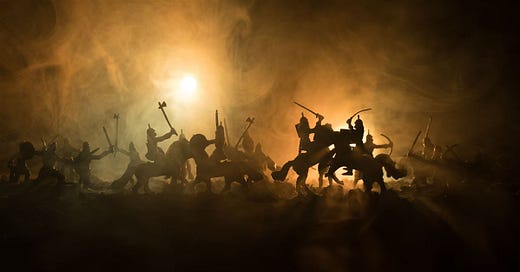Preparing for Spiritual Warfare (Part 1)
There's a war going on for your soul that most men are totally unaware of. It's time to prepare.
Spiritual warfare is a dimension of life that modern men are often completely unaware of, meaning all manner of suffering, pride, faulty desires, jealousies and lusts can plague their souls. Here is Part 1 outlining one to three of the seven weapons you can utilise in your spiritual life to guard, heal and strengthen the state of your soul.
I explored spiritual warfare in a recent video on the new channel and was eager to affirm that such warfare is on a whole other dimension than physical warfare.
Men must be aware of this distinction because if we’re not we’ll fall into the trap of using physical world techniques and get easily chewed up and spat out.
This isn’t to denigrate the warrior in the material world—such a man can be powerful, great even, in that domain—yet the reality is that you could be a 6’6’ Heavyweight Champ and it won’t make a jot of difference in spiritual warfare. Utilising such a man in spiritual warfare would be tantamount to pitting him against a tennis champion and expecting him to win in a race to three sets.
This is because spiritual warfare is more about retreating than attacking.
That’s a harsh sentence to read for many men who’ve learnt to navigate the challenges of life with grit, determination and physical prowess. Moreso, if you’ve found success in the world because of such aptitudes.
Not to mention, something about ‘retreat’ seems cowardly. However, that’s the case until we know what we’re retreating into.
***Before I get into the meat of this, let me be crystal clear, none of what I’m saying here is meant to denigrate the skill, brilliance and prowess of the physical warrior—some of his skills can be useful in spiritual warfare, but we must be clear that physical and spiritual warfare are different disciplines entirely.
Orientation: Ego vs Spirit
The essence of spiritual warfare is in the disentangling of your ego from reality so you can see the enemy as he is (and yourself) as you truly are. This is so important because, when in spiritual warfare, the enemy does not fight fair.
Here, there’s no referee, no rules, no honour. The floor can be pulled away from you at any moment, and when you finally see the enemy and mount your attack, you’ll find what you’re attacking is an illusion.
So, our first lesson is that to stand a chance in spiritual warfare, we must learn to be still—to not jump at every emotional pang or mental whim. This is the essence of all mystical spiritual teaching. We begin by coming to peace, we must learn to ‘be as you are’ as the Hindu sage Sri Ramana Maharshi put it.
When ‘being as we are’, this doesn't mean following a worldly identity, being right or wrong, or listening to the ideas/drama of the mind—it means letting go of all external identity and marinading in the silence, the stillness of Being itself to free ourselves from illusion and corruption.
This brings us to the first weapon of spiritual warfare.
1: Contemplation
In modernity, contemplation means to muse on an idea. That is not the aim here. Contemplation in the spiritual sense is more like meditation, yet where modern meditation has more of an Eastern (often Zen Buddhist) flavour that focuses on an ‘emptying’ of the mind, contemplation focuses on the divine source itself—whether you view that as God, Life or Being is up to you.
One common complaint when first embarking on contemplation/meditation is: ‘Why am I doing this? There’s nothing there!’
This is a brilliant point. Nothing, or ‘no thing’ is exactly the point. ‘No thing’ is anathema to modern man and this is why we practice contemplation. The mind, which in essence is the identity-forming ego, always wants something in the world. That something could be a cheesecake, a car, a fantasy, a woman, personal success—whatever—the point is that our conscious focus is always going outwards into the fool’s gold of a fallen world.
Contemplation then is the reverse of this. It’s the process of turning the conscious focus inwards onto the source of being, or awareness, itself to recognise your true transcendent nature which is beyond the drama of the world.
If you’d like some guidance on contemplation, do consider watching my guided video below:
Concerning spiritual warfare, the contemplative state is so imperative as this state of awareness allows us to spot when the dark forces of the world/ego descend upon us. For most of us, we don’t even recognise when we’re being driven by fear, anger, lust, sloth, envy, or self-centeredness, and this creates many troubles down the line.
With a regular practice of contemplation, we become aware of when spiritual warfare is beginning. Next, we must learn how to countenance it.
2: Unlearn to Learn
You may have noticed that everyone seems to know a great deal about spirituality and religion these days, even atheists are often eager to show how they’re experts as to why religion and spirituality are a load of nonsense, or even as to what the ‘true’ message of Jesus was.
Whether it’s religious folks arguing over whose specific interpretation is right, or atheists arguing why they’re all stupid fantasists, all of this is in the realm of the mind, which in essence, is the realm of modernity (intellectualism/modernism, etc).
One could argue this is a specific feature/flaw of Western Christianity. It’s been pointed out that the Apostle Paul, when spreading the good word, went to the philosophically inclined Western world rather than the mystical East. Paul was fluent in the language and ideas of Socrates and Plato, as well as having a penchant for logical debate. This could be an early indication as to why philosophy, but not mysticism, flourished in the Western world post-Christian influence.
This focus on logic, ideas and explanation made the West great in one sense, yet the downside has always been an over-focus (and arguably an over-confidence) in the power of the mind and the material. This is something religious leaders tried to overcome in the ‘Dark Ages’ yet in modernity the supremacy of the mind is clear to see with the prevalence of ‘science and ‘psychology’; and now Western man is paying the price for his total disconnection from the divine as the West crumbles from the inside out.
We can rediscover non-rational wisdom, mind. Once you know where to look you’ll see our culture is replete with mystical material, despite it generally being seen as a dimension found only in the East.
One of the most prominent examples here is the classic of medieval English mysticism (not for beginners) The Cloud of Unknowing (TCOU). Written in the 14th Century by an anonymous author, TCOU aids the modern reader in a most challenging endeavour—losing our faith in the mind and rationality and moving into the 'unknown’ to find the true Presence of God beyond ideas and forms.
As much as it frightens modern man, there is great freedom in saying ‘I don’t know’ and opening ourselves up totally to universal truth. This is perhaps why spiritual experience in this day and age tends to be relegated to the sinners and strugglers who, via humiliation and suffering have humility beaten into them.
Yet for average folks, we see the torturous merry-go-round of modern man trying to find his soul in a somewhat tragic figure like Jordan Peterson—as wonderfully bright as he may be, he seems to struggle to accept that it’s his endless explanations of God and Christianity that block him from witnessing the Presence of God. Put simply, his big and busy mind is blocking the light of the subtle foundational spirit. Intellectual ego is obfuscating the peace of Being,
When it comes to spiritual warfare then, we must be willing to lose our own biases and ideas, to unlearn what we have learned. Until we do this our inner world will be contorted and blended with ‘sinful’ notions that block us from true realisation.
We must, in Zen language, have ‘beginner’s mind’ (what Christ describes as being ‘like children’) to keep an open passage to God’s guiding love—this is the meaning of praying ‘unceasingly’.
3: Confession
Confession gets a bad rep in this day and age because of its association with sin. While it’s true that many priests and religious elders may harm their flocks by using their authority in the interests of worldly power and cruelty, or perhaps by perpetuating shame cycles, it’s also true that the ‘New Age’ spirituality of modernity has gone to the opposite extreme.
Now everything is ‘cool’ and ‘vibes-based’, nothing can be or should be questioned, no matter how morally dubious, nor how it could lead to one’s destruction.
As gestured to in the prior point, we must utilise ‘unlearning’ here and discover what ‘sin’ means in spiritual reality rather than what it means through the eyes of some bully priest or naive New Age ideologue.
As I explored in a recent video, if ‘sin’ stings, you’re getting closer to the truth—this implies something very important—if we have the consciousness to be aware of ‘sin’ and not make it a judgement of self (an act of the ego) but instead understand it as a teaching stemming from transcendent spiritual wisdom informing us that this isn’t the way, we have a chance to learn some very powerful lessons.
Sin, in essence, is simply the result of losing ‘The Way’, it is the price we pay for erring out of our true nature, which is peace and Oneness with God. Just as Adam did.
More importantly, we must understand that sin isn’t so much God’s ‘punishment’, but a reflection of being outside of God’s love, as being away from this force scolds the soul—not by God’s design but by our erring. This is why the great Anglican lay theologian C.S. Lewis stated that the ‘love of God lights up the fires of Hell’. Around the same time, the Christian New Thought figure Emmet Fox put it another way: “God doesn't punish us for our sin; we're punished by the sin itself”.
While with this understanding we begin to understand our innate freedom, the reality is that many of us are so embroiled in sin we need a major way of breaking free and healing our soul once and for all. That way is confession.
Whether you confess to a priest, religious/spiritual leader or trusted friend is up to you, but a maxim that’s served me well is total honesty with myself, another man and God. If I lose that honesty, I can expect trouble. This is because the dark forces of this world feast on untruths, guilt and shame, and the shadows provide fertile ground for demons to fester.
In the Christian tradition, we’re assured that all sins can be forgiven if we bring them to the foot of the cross and pin them up with Christ who paid the ultimate price. Note, this doesn't mean that justice shouldn’t be sought, nor restitution paid where it’s due and healthy, it means our souls can be free from demonic possession and attack. This will take far more from you than the world ever could.
In true confession, we don’t find ultimate judgement, but ultimate freedom.






